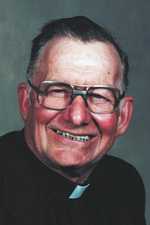By Msgr. Francis Henricksen

It was the fall of 1951 when I arrived at St. Paul Seminary in St. Paul, Minn. It was all together different from the seminary department of St. Ambrose College in Davenport but, nonetheless, the next step on the way to the priesthood. Amid uncertainty and fear of the future, I was reassured with the introduction of Deacon Gerald Hoenig and his two classmates (also deacons) from the Diocese of Davenport that all was well and we would hang together. A total of nine of us seminarians were there from Davenport.
Following that one-year meeting was the beginning of the priestly ministry of Father Gerald Hoenig, who came home to his diocese and spent the next 16 years as an assistant pastor. From parish ministry he stepped into a career that would involve him for nearly the next 40 years. He was appointed chaplain of the Iowa State Penitentiary at Fort Madison.
To an outsider — outside of the walls — I find it very hard to imagine what Father’s ministry was like. Obviously, he fulfilled the position and thrived in his concern and counseling and pastoring of the men behind the walls.
St. Mathew’s account in the 25th Chapter of his Gospel — the description of the last judgment by the Son of Man — certainly applies. It indicates the destiny of Fr. Hoenig without question. “Come, you that are blessed by my Father, inherit the kingdom prepared for you from the foundation of the world; … I was in prison and you visited me … As long as you did it for the least of my brothers, you did it for me.” This is the story of a true and faithful servant.
Fr. Gerry is also the fulfillment of the old adage: “You can take the boy from the farm, but you can’t take the farm from the boy.” This is truly to his credit and not in any way detracts from his priestly ministry. As a testimony to this, I want to quote from a sermon of the late Bishop Peter Bartholome of St. Cloud, Minn. He was very closely connected as Episcopal moderator of the National Catholic Rural Life Conference for many years. I think his sermon describes perfectly the person of Fr. Hoenig:
“Through the land, man is best able to work up to the fullest development of his nature as created by God. On the land man is closest to God’s creation and should therefore with greater facility work out his soul’s salvation … And at the end of his life the body of man again returns and becomes identified with the land. Truly there seems to be no relationship of man with material things so intimate as that of man with the earth.”
Maybe Fr. Gerry can inspire all of us — even if not farmers — to a renewed sense of responsible stewardship of God’s gifts of creation. We are grateful for all of his years of ministry in the priesthood and dedication to his calling. We can also rejoice with him that he still found time to be with his dogs to go coon hunting — his favorite sport.
Obituary for Fr. Gerald Hoenig
Father Gerald Hoenig, 85, died Sept. 4 at the home of his sister in Fort Madison.
Born Nov. 5, 1926, in Fort Madison, he attended St. Mary Catholic School in West Point and Loras Academy in Dubuque. He graduated from St. Ambrose College in Davenport with a degree in philosophy. He completed his theological studies at St. Paul Seminary in St. Paul, Minn.
On March 29, 1952, he was ordained to the priesthood by Bishop Ralph Hayes at Sacred Heart Cathedral in Davenport.
Fr. Hoenig was an assistant at St. Patrick Parish in Burlington from 1952-56 and St. Patrick Parish in Ottumwa from 1965-68. He then served as a chaplain at Sacred Heart Hospital in Fort Madison from 1968-69 and the Iowa State Penitentiary in Fort Madison from 1968-2001. He served as pastor of St. Mary Parish in Augusta from 1985-88 and St. Joseph Parish in Montrose from 1988-2001. He retired in 2001.
Fr. Hoenig also was a chaplain in the Army Reserves and member of Fort Madison Knights of Columbus Council 739.
His funeral was held Sept. 7 at St. Mary of the Assumption Church in West Point. Burial was in Calvary Cemetery in West Point.
Memorials may be made to St. Joseph Parish in Montrose.







